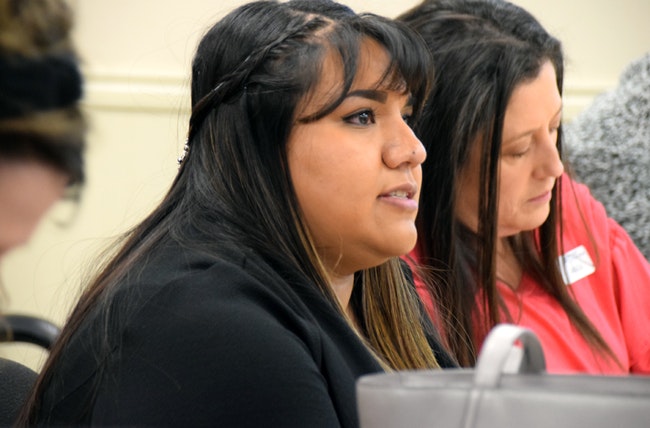
Norma Ramirez, programs manager for Euvalcree, is leading the nonprofit’s efforts to help promote the Census among the county’s Latino population. (The Enterprise/Yadira Lopez)
ONTARIO – When Norma Ramirez came home from middle school 10 years ago with a Census packet for her family to fill out, her parents waved it off.
Farmworkers in Vale, they didn’t understand the Census and neither did she. So Ramirez and her family weren’t counted.
Now Ramirez, a programs manager at the nonprofit Euvalcree, knows better.
The nonprofit received a grant from the United Way to set up a Census Assistance Center at its offices in Hermiston and Ontario. Ramirez is working on outreach to promote the decennial questionnaire to people who, like her own family, are considered by the Census as “hard to count” populations.
“Our goal is to have everybody counted,” Ramirez said. “There’s a lot at stake for Oregon.”
The state could stand to gain a minimum of $13 billion in additional federal funding if everyone in Oregon is counted. A sixth congressional seat for the state is also possible.
Local governments receive their slice of several tax revenues based on population. In the current budget year, each person is worth $18.27 in liquor tax revenue and $1.13 for cigarettes for local cities.
Cities also are projected to receive $72.67 per person from the Highway Trust Fund.
But about 1 million people are at risk of being undercounted in Oregon.
It’s not just Latinos that are considered hard to count.
[ KEEP YOUR LOCAL NEWS STRONG – SUBSCRIBE ]
Other populations identified by the Census include renters, the homeless, disabled people, the LGBTQ population and children under 5. Rural residents and the elderly are also at risk of not being counted.
The Census Bureau encouraged local governments across the U.S. to set up Complete Count Committees as a way of promoting the questionnaire.
 Peter Hall, co-chair of the City of Ontario’s Complete Count Committee, monitors the discussion as the group brainstorm ways to ensure everyone gets counted in the upcoming Census. (The Enterprise/Yadira Lopez)
Peter Hall, co-chair of the City of Ontario’s Complete Count Committee, monitors the discussion as the group brainstorm ways to ensure everyone gets counted in the upcoming Census. (The Enterprise/Yadira Lopez)
Since September, about a dozen representatives from different groups in Ontario, including local schools and nonprofits, have been meeting monthly to brainstorm ways of ensuring everyone gets counted.
There is currently no Complete Count Committee in Nyssa or Vale.
Peter Hall, Ontario city human resources manager, co-chairs the city’s committee. There’s a lot of money that can potentially come into the community if everyone gets counted, he said, but that’s not the only reason the count matters.
The tax money coming in pays for programs that are often geared toward those hard to reach populations, said Hall.
“It’s really a tough cycle when someone can’t take the Census because there’s a disability or fear or a language barrier and then down the road we don’t receive the funding that can help these people with other aspects of their life,” Hall said.
Ramirez understands the fear part. She said a lack of trust in the government is likely the biggest reason why many Latinos don’t fill out the Census.
“They don’t want the government to know we’re here, especially if they’re undocumented,” she said.
Many Latinos are citizens, she added, but it is highly likely that they’re living with a noncitizen or know one.
“They won’t give their information out if they feel they could be putting someone else in jeopardy,” Ramirez said. “There goes that person that’s not counted either.”
Misconceptions about the privacy of the Census abound, she added.
Ramirez said many people don’t realize that all the information provided to the Census is protected by Title 13 of the U.S. Code, a law that provides protections for the information collected through the Census.
Euvalcree is trying to eliminate those misconceptions, she said. The grant it received trained Ramirez to give Census 101 presentations to local community partners such as the Malheur County Health Department. In her presentations, she stresses confidentiality.
 Lynne Gross, partnership specialist in eastern Oregon for the U.S. Census Bureau, gives a presentation last week at a meeting for the City of Ontario’s Complete Count Committee. (The Enterprise/Yadira Lopez)
Lynne Gross, partnership specialist in eastern Oregon for the U.S. Census Bureau, gives a presentation last week at a meeting for the City of Ontario’s Complete Count Committee. (The Enterprise/Yadira Lopez)
The hope is that these organizations will pass along the information to the communities they serve.
“It comes down to getting the word out,” Ramirez said.
Euvalcree also has strong ties to the local Latino community, which Ramirez thinks may help encourage locals to come in and get help with filling out the Census.
Come April 1 – official Census Day – the nonprofit will be ready with extra tablets and an additional computer for anyone who wants to walk in and receive help filling out the forms.
The staff will be trained to answer common questions: Whether to count family members who are living in the home temporarily or unborn babies. The answer to both questions: Yes.
Euvalcree is one of two Census Assistance Centers in the county. The Immigrant and Refugee Community Organization also received a United Way grant to set up an outpost at the Four Rivers Welcome Center in Ontario, a nonprofit that assists local refugees and recent immigrants. Many have Arabic or Somali as their mother tongue.
“This is our chance to tell the government, we exist, we’re here,” Ramirez said.
News tip? Reporter Yadira Lopez: [email protected]
For the latest news, follow the Enterprise on Facebook and Twitter.
SUBSCRIBE TO HELP PRODUCE VITAL REPORTING — For $5 a month, you get breaking news alerts, emailed newsletters and around-the-clock access to our stories. We depend on subscribers to pay for in-depth, accurate news produced by a professional and highly trained staff. Help us grow and get better with your subscription. Sign up HERE.




